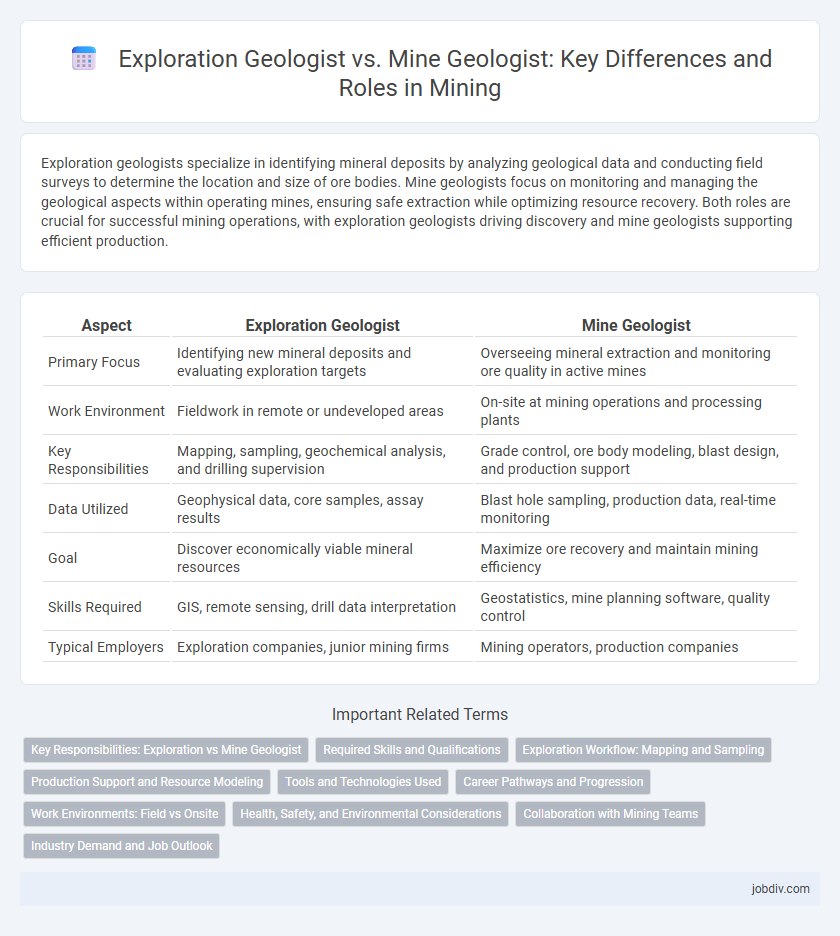Exploration geologists specialize in identifying mineral deposits by analyzing geological data and conducting field surveys to determine the location and size of ore bodies. Mine geologists focus on monitoring and managing the geological aspects within operating mines, ensuring safe extraction while optimizing resource recovery. Both roles are crucial for successful mining operations, with exploration geologists driving discovery and mine geologists supporting efficient production.
Table of Comparison
| Aspect | Exploration Geologist | Mine Geologist |
|---|---|---|
| Primary Focus | Identifying new mineral deposits and evaluating exploration targets | Overseeing mineral extraction and monitoring ore quality in active mines |
| Work Environment | Fieldwork in remote or undeveloped areas | On-site at mining operations and processing plants |
| Key Responsibilities | Mapping, sampling, geochemical analysis, and drilling supervision | Grade control, ore body modeling, blast design, and production support |
| Data Utilized | Geophysical data, core samples, assay results | Blast hole sampling, production data, real-time monitoring |
| Goal | Discover economically viable mineral resources | Maximize ore recovery and maintain mining efficiency |
| Skills Required | GIS, remote sensing, drill data interpretation | Geostatistics, mine planning software, quality control |
| Typical Employers | Exploration companies, junior mining firms | Mining operators, production companies |
Key Responsibilities: Exploration vs Mine Geologist
Exploration geologists primarily focus on identifying and evaluating mineral deposits, conducting geological mapping, sampling, and drilling to locate economically viable resources. Mine geologists, on the other hand, monitor and analyze geological conditions within active mining operations, providing real-time data to optimize extraction processes and ensure safety. Both roles require expertise in mineralogy and geology, but exploration geologists emphasize discovery, while mine geologists concentrate on resource management and operational support.
Required Skills and Qualifications
Exploration geologists require expertise in remote sensing, geophysical data interpretation, and mineral deposit modeling, often holding degrees in geology or earth sciences with strong analytical skills. Mine geologists emphasize skills in ore grade control, underground mapping, and real-time data analysis, typically needing experience in mining operations and safety protocols. Both roles demand proficiency in geospatial software and strong communication abilities to collaborate with multidisciplinary teams.
Exploration Workflow: Mapping and Sampling
Exploration geologists focus on detailed mapping and sampling to identify mineral deposits, employing techniques such as geochemical analysis and geophysical surveys to delineate prospective zones. Mine geologists concentrate on mapping underground workings and sampling ore bodies to optimize grade control and support mine planning. Both roles integrate spatial data into geological models but prioritize different stages of the mineral exploration and mining cycle.
Production Support and Resource Modeling
Exploration geologists focus on identifying and evaluating mineral deposits, providing critical data for resource modeling to estimate ore quantity and quality. Mine geologists support production by monitoring ore extraction, ensuring grade control, and updating resource models in real time to optimize mine planning. Effective collaboration between exploration and mine geology teams enhances resource accuracy and production efficiency in mining operations.
Tools and Technologies Used
Exploration geologists utilize advanced geophysical tools such as magnetometers, resistivity meters, and GPS mapping devices to identify mineral deposits and assess subsurface geology. Mine geologists rely on real-time data collection technologies like blast-hole logging systems, 3D geological modeling software, and portable X-ray fluorescence (XRF) analyzers for ore grade control and mine planning. Both roles integrate spatial analysis platforms and drone surveying to enhance accuracy and efficiency in geological assessments.
Career Pathways and Progression
Exploration geologists focus on identifying and evaluating new mineral deposits through field mapping, sampling, and geophysical surveys, often starting as junior geologists before advancing to senior exploration roles or project managers. Mine geologists concentrate on monitoring and managing ore extraction processes within operating mines, progressing from site geologists to mine geologists and eventually to roles such as resource geologists or mine geologists supervisors. Career pathways for exploration geologists typically lead to corporate exploration management or technical specialist roles, while mine geologists often move into mine planning, production management, or resource estimation positions.
Work Environments: Field vs Onsite
Exploration geologists primarily work in remote field environments, conducting geological surveys and collecting samples to identify potential mineral deposits. Mine geologists operate onsite within active mining areas, focusing on ore grade control and ensuring safety during extraction processes. Each role requires adapting to different working conditions, with exploration geologists facing rugged terrains while mine geologists deal with operational mining sites.
Health, Safety, and Environmental Considerations
Exploration geologists prioritize site reconnaissance and sampling to identify mineral deposits while adhering to strict health and safety protocols that minimize environmental disruption. Mine geologists focus on continuous monitoring of ore extraction processes, implementing safety measures to prevent accidents and controlling environmental impacts such as dust and water contamination. Both roles require rigorous compliance with environmental regulations and the adoption of sustainable practices to protect workers and surrounding ecosystems.
Collaboration with Mining Teams
Exploration geologists work closely with mining teams to identify and evaluate potential mineral deposits, using geological mapping, sampling, and geophysical data to guide drilling and resource estimation. Mine geologists collaborate with production teams to monitor ore extraction, optimize mine plans, and ensure the quality control of extracted materials. Both roles require seamless communication and data sharing to maximize resource recovery and ensure operational efficiency throughout the mining lifecycle.
Industry Demand and Job Outlook
Exploration geologists are in high demand due to the continuous need for discovering new mineral deposits essential for sustaining the mining industry's future. Mine geologists, crucial for on-site ore grade control and safety, remain indispensable as mining operations expand and modernize. The job outlook for both roles shows steady growth, driven by increasing investment in mining technologies and the global push for critical minerals.
Exploration Geologist vs Mine Geologist Infographic

 jobdiv.com
jobdiv.com